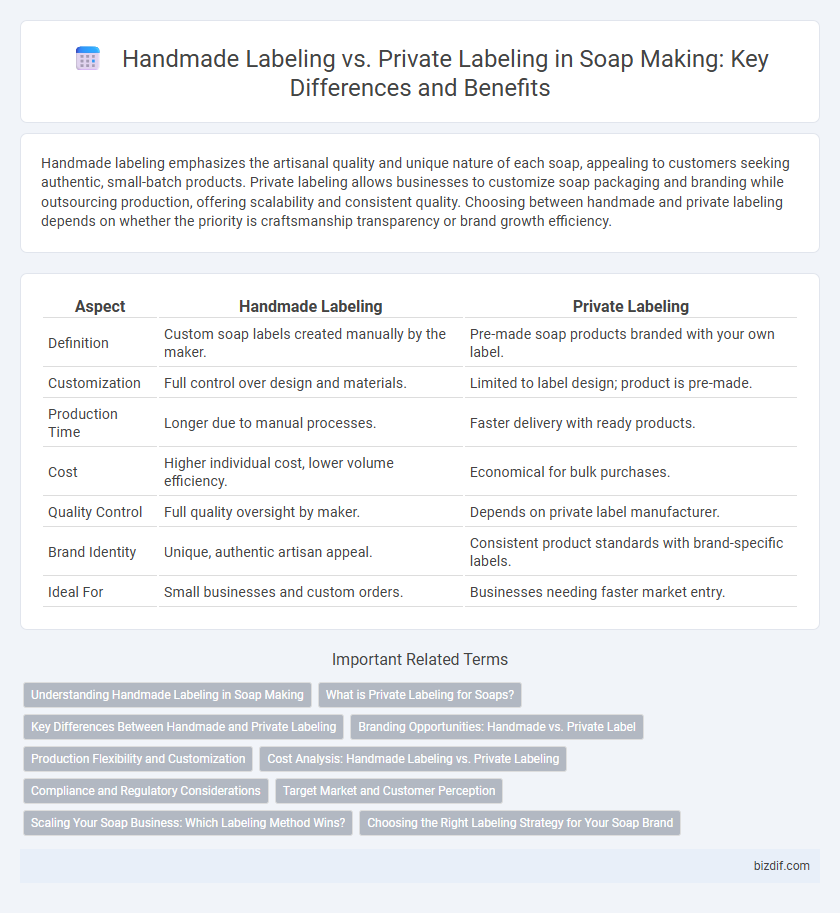Handmade labeling emphasizes the artisanal quality and unique nature of each soap, appealing to customers seeking authentic, small-batch products. Private labeling allows businesses to customize soap packaging and branding while outsourcing production, offering scalability and consistent quality. Choosing between handmade and private labeling depends on whether the priority is craftsmanship transparency or brand growth efficiency.
Table of Comparison
| Aspect | Handmade Labeling | Private Labeling |
|---|---|---|
| Definition | Custom soap labels created manually by the maker. | Pre-made soap products branded with your own label. |
| Customization | Full control over design and materials. | Limited to label design; product is pre-made. |
| Production Time | Longer due to manual processes. | Faster delivery with ready products. |
| Cost | Higher individual cost, lower volume efficiency. | Economical for bulk purchases. |
| Quality Control | Full quality oversight by maker. | Depends on private label manufacturer. |
| Brand Identity | Unique, authentic artisan appeal. | Consistent product standards with brand-specific labels. |
| Ideal For | Small businesses and custom orders. | Businesses needing faster market entry. |
Understanding Handmade Labeling in Soap Making
Handmade labeling in soap making emphasizes authentic craftsmanship, highlighting ingredients sourced naturally and production methods that avoid mass manufacturing. This approach builds consumer trust by showcasing transparency about the soap's origins, including small-batch processes and artisan techniques. Clear handmade labeling differentiates products in a competitive market, appealing to eco-conscious and quality-focused buyers seeking genuine, handcrafted soaps.
What is Private Labeling for Soaps?
Private labeling for soaps involves sourcing pre-made soap products from a manufacturer and branding them with a retailer's custom label or packaging. This approach allows businesses to offer unique soap lines without investing in the complex and time-consuming soap production process. Private labeling ensures consistent product quality while enabling brand differentiation through customized labels and marketing.
Key Differences Between Handmade and Private Labeling
Handmade labeling emphasizes unique, artisan-crafted soaps with distinct personal branding, highlighting originality and small batch production. Private labeling involves purchasing pre-made soap products from manufacturers and branding them under a retailer's label, enabling faster market entry and consistent product qualities. The key differences lie in production control, customization options, and brand authenticity, with handmade offering more customization and private labeling focusing on scalability.
Branding Opportunities: Handmade vs. Private Label
Handmade labeling offers unique branding opportunities through authentic storytelling, emphasizing craftsmanship and personal touch that resonate deeply with niche markets seeking artisanal quality. Private labeling enables broader brand scalability, allowing businesses to focus on marketing and customer loyalty while utilizing pre-formulated products, streamlining operations. Both strategies cater to different branding needs, with handmade labels fostering brand exclusivity and private labels supporting faster market penetration.
Production Flexibility and Customization
Handmade labeling in soap making offers greater production flexibility, allowing artisans to adjust recipes and designs according to small-batch demands and seasonal trends. Private labeling typically involves larger batch sizes with predefined formulations, limiting customization but enabling scalable and consistent branding. Choosing between handmade and private labeling depends on the balance between unique product customization and mass production efficiency.
Cost Analysis: Handmade Labeling vs. Private Labeling
Handmade labeling typically incurs lower upfront costs as it involves designing and printing labels in small batches, reducing initial investment for small soap makers. Private labeling requires higher initial expenses due to bulk ordering and brand customization but offers scalability and professional branding advantages. Careful cost analysis reveals handmade labeling suits artisan producers prioritizing minimal expenses, while private labeling benefits businesses aiming for growth and consistent market presence.
Compliance and Regulatory Considerations
Handmade labeling requires strict adherence to FDA guidelines, including accurate ingredient declarations and allergen warnings, ensuring transparency for consumers. Private labeling demands compliance with both the manufacturer's standards and the retailer's branding regulations, often involving additional scrutiny on product claims and certifications. Understanding these regulatory nuances is crucial for avoiding legal issues and maintaining consumer trust in soap products.
Target Market and Customer Perception
Handmade labeling appeals to niche markets valuing authenticity, craftsmanship, and artisanal quality, often attracting customers seeking unique, small-batch soap products. Private labeling targets broader markets with customizable branding options, allowing businesses to create a distinct identity while benefiting from established production processes. Customer perception favors handmade labels for perceived natural ingredients and exclusivity, whereas private labels are seen as consistent and professional, catering to retail and mass-market demands.
Scaling Your Soap Business: Which Labeling Method Wins?
Handmade labeling emphasizes unique, artisanal appeal by showcasing the creator's personal touch, ideal for small-scale soap businesses seeking authenticity and customer connection. Private labeling enables faster scaling by outsourcing branding and packaging to manufacturers, allowing businesses to focus on production volume and market expansion without the complexities of design. Choosing between handmade and private labeling largely depends on whether the soap business prioritizes brand authenticity or rapid growth in competitive markets.
Choosing the Right Labeling Strategy for Your Soap Brand
Handmade labeling emphasizes authenticity and craftsmanship, often appealing to niche markets valuing artisanal qualities in soap products. Private labeling allows for scalable branding solutions by customizing pre-made soaps under your own brand, ideal for businesses seeking market expansion without production overhead. Selecting the right labeling strategy depends on your target audience, production capacity, and brand identity, balancing differentiation with operational efficiency.
Handmade Labeling vs Private Labeling Infographic

 bizdif.com
bizdif.com